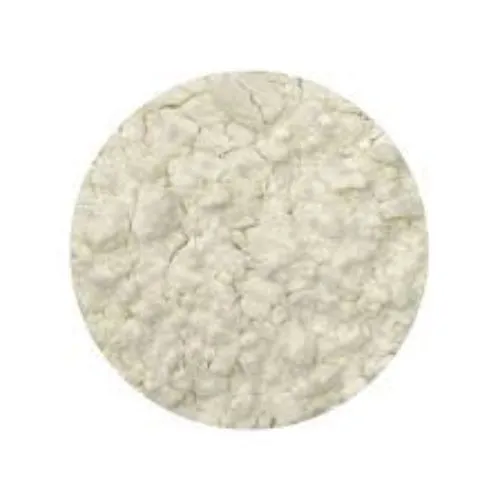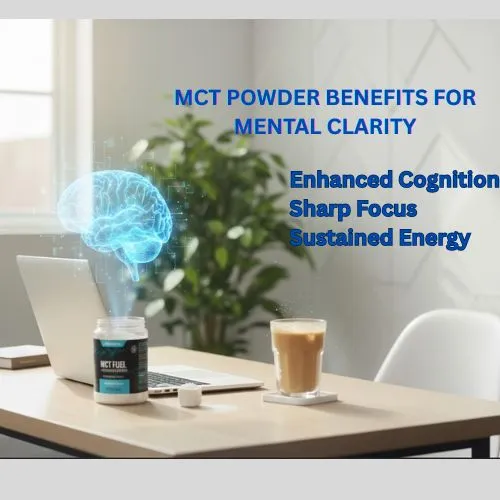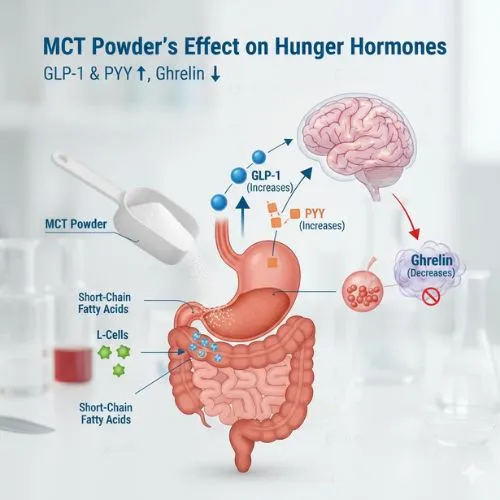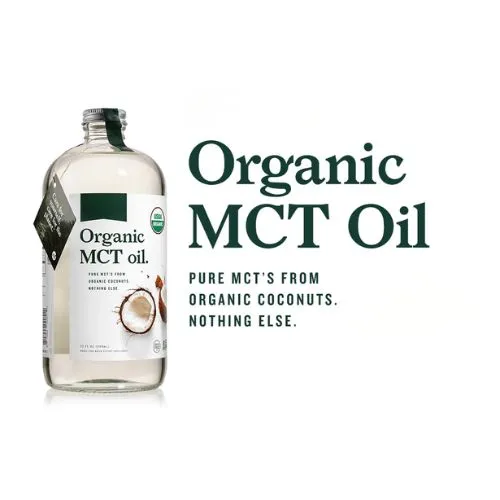How does MCT impact appetite and hunger hormones?
Medium-chain triglycerides (MCTs) have gained significant attention in the health and wellness community for their potential impact on appetite control and weight management. As a unique type of fat that is metabolized differently from long-chain triglycerides, MCTs offer a range of benefits that can influence our eating habits and overall health. In this comprehensive guide, we'll explore how MCT powder, a convenient form of MCTs, affects appetite and hunger hormones, and how you can leverage its properties for better weight management.

Top Benefits of MCT Powder for Appetite Control
Rapid Energy Source
MCT powder provides a quick and efficient energy source for the body. Unlike long-chain triglycerides, MCTs are absorbed directly into the bloodstream and transported to the liver, where they're rapidly converted into ketones. This process bypasses the usual digestive pathway, resulting in a swift energy boost that can help curb hunger and reduce overall calorie intake.
Increased Satiety
One of the most notable benefits of MCT powder is its ability to enhance feelings of fullness and satiety. Studies have shown that consuming MCTs can lead to reduced food intake in subsequent meals, potentially aiding in weight management efforts. This increased satiety is partly due to the thermogenic effect of MCTs, which can boost metabolism and energy expenditure.
Improved Metabolic Function
MCT powder has been associated with improved metabolic function, which can indirectly affect appetite control. By enhancing the body's ability to burn fat for fuel, MCTs may help stabilize blood sugar levels and reduce cravings for high-carbohydrate foods. This metabolic shift can lead to more consistent energy levels throughout the day, reducing the likelihood of snacking or overeating.

How MCT Powder Influences Hunger Hormones?
Impact on Ghrelin
Ghrelin, often referred to as the "hunger hormone," plays a crucial role in stimulating appetite and promoting food intake. Research suggests that MCT consumption may help suppress ghrelin levels, leading to reduced hunger sensations. By modulating ghrelin secretion, MCT powder can potentially help individuals better manage their appetite and adhere to calorie-restricted diets more easily.
Effects on Leptin
Leptin, known as the "satiety hormone," is responsible for signaling fullness to the brain. While MCTs don't directly increase leptin production, they may enhance leptin sensitivity. Improved leptin sensitivity allows the body to more effectively recognize when it's full, potentially leading to reduced food intake and better appetite control. This mechanism can be particularly beneficial for individuals struggling with leptin resistance, a common issue in obesity.
Cholecystokinin (CCK) Stimulation
MCT powder has been shown to stimulate the release of cholecystokinin (CCK), a hormone that promotes feelings of fullness and slows gastric emptying. By increasing CCK levels, MCTs can help prolong the sensation of satiety after meals, potentially reducing overall calorie intake throughout the day. This hormonal effect contributes to the appetite-suppressing properties of MCT powder.

Best Ways to Use MCT Powder for Weight Management
Incorporating MCT Powder into Your Diet
To maximize the appetite-controlling benefits of MCT powder, it's essential to incorporate it strategically into your diet. Here are some effective ways to use MCT powder for weight management:
- Add it to your morning coffee or tea for a sustained energy boost
- Mix it into smoothies or protein shakes for enhanced satiety
- Sprinkle it over salads or use it in homemade salad dressings
- Incorporate it into baked goods or energy bars for a nutrient-dense snack
- Use it as a pre-workout supplement to support fat burning during exercise
Optimal Dosage and Timing
While MCT powder can be beneficial for appetite control, it's crucial to start with a low dose and gradually increase intake to avoid digestive discomfort. A typical starting dose is 1-2 tablespoons per day, divided into smaller servings. For optimal appetite suppression, consider taking MCT powder 30-60 minutes before meals or as part of a balanced breakfast to promote fullness throughout the day.
Combining MCT Powder with Other Strategies
To enhance the appetite-controlling effects of MCT powder, consider combining it with other evidence-based weight management strategies:
- Practice intermittent fasting, using MCT powder to help manage hunger during fasting periods
- Pair MCT powder with a high-protein diet to further increase satiety and support muscle maintenance
- Incorporate MCT powder into a ketogenic diet to promote ketosis and fat burning
- Use MCT powder as part of a pre-workout routine to support fat oxidation during exercise
- Combine MCT powder with fiber-rich foods to enhance its satiating effects
Potential Side Effects and Precautions
While MCT powder is generally well-tolerated, some individuals may experience digestive issues when first incorporating it into their diet. Common side effects can include stomach discomfort, diarrhea, or nausea. To minimize these effects, start with a small dose and gradually increase intake over time. It's also important to choose a high-quality MCT powder from a reputable MCT powder manufacturer to ensure purity and effectiveness.

Conclusion
MCT powder offers a promising approach to appetite control and weight management by influencing hunger hormones and promoting satiety. Its rapid absorption and conversion into ketones provide a quick energy source, while its effects on ghrelin, leptin, and CCK contribute to reduced hunger and increased fullness. By incorporating MCT powder strategically into your diet and combining it with other weight management strategies, you can potentially enhance your body's ability to control appetite and manage calorie intake more effectively.
If you're looking to experience the benefits of MCT powder for yourself, consider exploring high-quality options from reputable manufacturers. Yangge Biotech Co., Ltd. offers premium MCT powder derived from coconut sources, ensuring purity and effectiveness. With our commitment to quality and innovation, we provide MCT powder that can seamlessly integrate into your wellness routine. At Yangge Biotech Co., Ltd., we specialize in producing high-quality MCT powder that meets the highest standards of purity and effectiveness. Our MCT powder is derived from premium coconut sources, ensuring you receive the full benefits of medium-chain triglycerides for appetite control and weight management. As an ISO, HACCP, Kosher, and Halal certified company, we guarantee the quality and safety of our products. Experience the difference with Yangge's MCT powder and take the first step towards better appetite control today. For more information or to place an order, contact us at info@yanggebiotech.com.
FAQ
Q: Can we get some samples to test before purchasing?
A: Of course, we can provide free samples of 20 to 100 grams, but the shipping cost is at the customer's expense. The shipping cost can be deducted from the next order, or the samples can be sent through your courier account.
Q: Do your products have relevant certifications?
A: Yes, our products are certified for HALAL, ISO, HACCP, Kosher, and other certifications.
Q: What is the minimum order quantity (MOQ)?
A: Small batches of samples can be customized according to your requirements.
Q: Do you offer OEM and ODM services? Can the formula be customized based on our own?
A: Of course, we provide ODM and OEM services to many customers. Our product range includes softgels, capsules, tablets, sachets, granules, and private label services. Simply contact us and let us know your requirements. Our experienced R&D team can also develop new products with specific formulas.
Please contact us to design your own branded products.
Q: How do you handle quality complaints?
A: First, we have a comprehensive quality control SOP. We provide authoritative third-party inspection reports for almost all products before shipment to minimize the possibility of quality issues. Second, we have a comprehensive return and exchange procedure. If there is a genuine quality dispute, we will strictly follow the SOP.
Q: How do you ship? How long does delivery take?
A: For small orders, we typically use DHL, UPS, EMS, FedEx, or TNT. Delivery typically takes 3-7 days. We also offer air and sea freight services. We have a strong freight forwarding team and can provide you with a one-stop service, including DDP and DDU.
Q: What are your payment terms?
A: 100% prepayment, payable by T/T, Western Union, MoneyGram, or PayPal.
Q: What is the shelf life of your products?
A: 2 years with proper storage.
Q: Is the packaging environmentally friendly?
A: We attach great importance to environmental protection and are constantly improving our product packaging. Some products are packaged in recyclable paper. Packaging materials are carefully selected to ensure product safety during transportation and storage, and to minimize environmental impact. We are committed to achieving a balance between environmental friendliness and practicality in our product packaging, and to contributing to sustainable development.
References
1. St-Onge, M. P., & Jones, P. J. (2002). Physiological effects of medium-chain triglycerides: potential agents in the prevention of obesity. The Journal of Nutrition, 132(3), 329-332.
2. Clegg, M. E. (2010). Medium-chain triglycerides are advantageous in promoting weight loss although not beneficial to exercise performance. International Journal of Food Sciences and Nutrition, 61(7), 653-679.
3. Kinsella, R., Maher, T., & Clegg, M. E. (2017). Coconut oil has less satiating properties than medium chain triglyceride oil. Physiology & Behavior, 179, 422-426.
4. Mumme, K., & Stonehouse, W. (2015). Effects of medium-chain triglycerides on weight loss and body composition: a meta-analysis of randomized controlled trials. Journal of the Academy of Nutrition and Dietetics, 115(2), 249-263.
5. Marten, B., Pfeuffer, M., & Schrezenmeir, J. (2006). Medium-chain triglycerides. International Dairy Journal, 16(11), 1374-1382.

Based on your location and order quantity, you will have the opportunity to receive a limited time free shipping promotion!

Who we are


